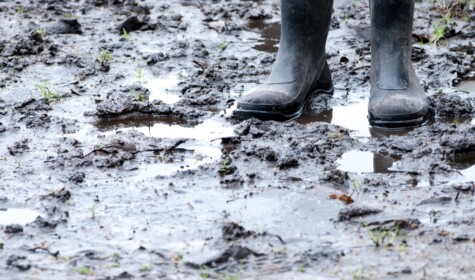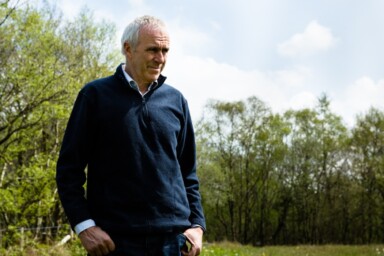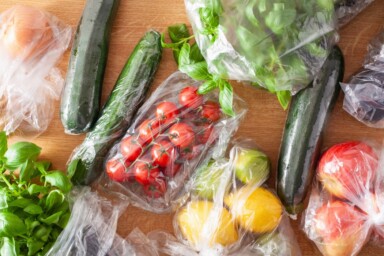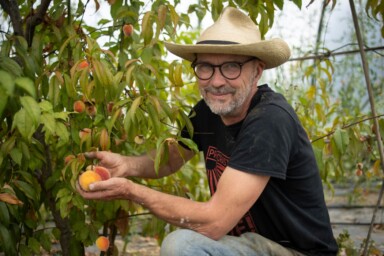Extreme weather events are putting smaller and medium scale growers under strain as they strive to meet customers’ needs at an affordable price. Here, organic grower, Alicia Miller, shares how climate change is impacting their approach at Troed y Rhiw Organics – a mixed farm and vegetable box scheme in West Wales.
This year’s ‘hungry gap’ is going to be a tough one – there’s no denying it. On our farm, we’ve been bracing for the impact. This is the time of year when running a box scheme is truly no fun. Our winter crops are finished – no greens or winter salads, purple sprouting broccoli and calabrese are over, and truly everyone is fed-up with celeriac, swede and kale. So, as we run the box scheme year-round, this it the time when we start ‘buying in’.
On the one hand, it’s a relief for our customers to have something different in their box – peppers and courgettes coming in from Europe make pretty much everyone happy. On the other hand, our costs go up significantly which in this economic climate, is extremely difficult.
And, if you haven’t noticed
The economy isn’t getting any better – despite recent headlines, the economic situation for most people (and small businesses) remains perilous. We’ve tried to keep our prices stable, but the hungry gap has made an increase a necessity. Prices are still climbing, even with the downturn in inflation. Explaining the rise to our box scheme customers is not going to be easy – a £1 increase in box costs is hard to swallow for many. We’re expecting some of them to leave, simply because they’ve hit the threshold of what they can afford to pay.
As small-scale producers, the rising costs are hitting us as well and we are near-on desperate to reach the summer when our crops, we hope, will finally arrive and our costs, at least in the short term, will go down a bit. It’s not easy communicating the value of what small-scale producers provide – supermarkets so easily undercut us because the price for customers at the check-out isn’t an honest reflection of the true cost of production. Many of the damaging externalities of industrial food production are paid by the public in ways we don’t even think about – our water bills, taxation and lost income from ill health are just a few examples.
Despite this, we persevere – what choice do we have? There are a few new crops coming along: spring onions, radishes, spring greens and I’d like to say strawberries, but they are very slow this year. The asparagus has arrived from the Borders, and at our Monday market it flies off the stall. New potatoes should be with us shortly, though again, it’s hard to tell for sure. But in the meantime, we are stuck with imports, and they are pricey.
Brexit fall-out – still falling out eight years on
The phrase ‘unmitigated disaster’ comes to mind quite frequently with any mention of Brexit. A 2023 Farmer’s Weekly survey detailed the list of woes, “Increased red tape, a worsening economic situation, damaging free-trade deals, a trail of broken promises – it seems that farmers…are far from satisfied with Brexit.” Three-quarters of those participating in the survey felt that Brexit had a bad impact on the economy as a whole and a slightly smaller number felt that it was “fairly negative” or “very negative” for their business.
The hardest hit by Brexit are upland farmers who have been pretty much written out of the Sustainable Farming Incentive (SFI) – with the SFI providing only a third of what the BPS did. Suggestions of diversification are really just a pipe dream, being realistic. This past autumn, Marianne Landzettel wrote for the SFT on Brexit’s impact on upland farmers. In a profile on farmer Michael Walton, Landzettel outlined what Walton would get from the SFI: “Under the EU Basic Payment Scheme, [Walton] received £55,000 which made up 50-60% of the farm’s income. From the SFI options available, he will receive £4,000 at best. Which means that by 2027, he will be £50,000 worse off than pre-Brexit.” While Defra has stepped up support for upland farmers more recently, they’ve still got the very short end of the stick.
And then there’s the weather!
After a spectacular hot, dry May and June in 2023, the rain kicked off round about early July. Instead of a continuation of the previous months, which though unexpectedly hot, and nightmarish for farmers who watched their grass wither, was a welcome stretch of proper summer. However, it didn’t take long before the wet returned and had a long-extended run for the next nine months, with little respite, bringing many farmers to their knees as they tried to farm on land that was deeply water-logged. Arable and horticulture crops across the UK have been seriously affected and it is anticipated that the UK will be reliant on grain imports for at least the coming year.
Climate change is visible everywhere on the earth now, in its varied presentations, and UK farmers, unquestionably, now know it up close and personally. We haven’t quite adjusted to it, but the rain was a great big wake-up call – especially here in Wales which saw well more than its fair share. The capriciousness of climate change will keep calling us out, no doubt, so we need to think about the meaning and growing importance of sustainable farming – be that organic, regenerative, agroecological or biodynamic. How do we build a route to improved farm resilience and better food security? It’s only through a holistic approach to sustainability that encompasses all the diverse aspects that feed into how our food is produced – both good and bad. Properly measuring the outcomes using a consistent common framework will give us a baseline to extrapolate from – which is critical.
This is no time for naïvety. While the economy and Brexit have made a real mess of things, we need to focus – seriously focus – on how we turn all of this around. We need to consider the bigger picture – what do we need to be doing to make it through the next nine months of rain? Or possibly drought? Whatever is coming our way, we’re not going to survive this without a radical overhaul of how we farm and how we eat. There’s a nation to feed and we need to feed it much better than we do.
Read Feeding Britain from the Ground Up to learn more about how we can farm more sustainably while improving food security and public health.






